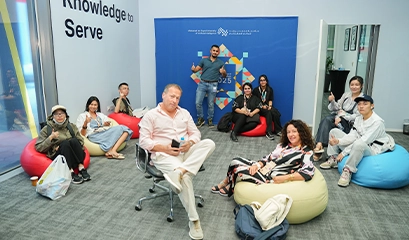When does the 2026 Fall semester start?
The 2026 Fall semester begins in mid-August 2026.
When is the application deadline for ED (Early Decision) and RD (Regular Decision) for 2026 Fall application?
-
 Application open for both ED & RD: Sep 1st 2025
Application open for both ED & RD: Sep 1st 2025
-
 Application deadline for ED: Nov 15th 2025
Application deadline for ED: Nov 15th 2025
-
 Final offer decisions for ED: Dec. 31st 2025
Final offer decisions for ED: Dec. 31st 2025
-
 Application deadline for RD: Apr 30th 2026
Application deadline for RD: Apr 30th 2026
-
 Final offer decisions for RD: Jun 15th 2026
Final offer decisions for RD: Jun 15th 2026
Early Decision (ED) application is a binding commitment. If accepted, the applicant is legally and morally obligated to attend MBZUAI and withdraw all other applications.
All ED and RD applications are reviewed on a rolling basis, so early submission is encouraged.
Who can I contact for more information about the undergraduate program?
For inquiries, please email
ai.ug@mbzuai.ac.ae.
For admissions questions, please email
ug.admission@mbzuai.ac.ae.
Is there an age limit to apply?
No, there is no age limit.
Is there an application fee?
No, there is no application fee.
What are the English proficiency requirements?
All applicants whose first language is not English must demonstrate proficiency in English through one of the following:
*MOI (Medium of Instruction) Letter: Provisionally accepted at the time of application submission, subject to review and verification. If not approved, students will be required to submit an approved ELP test score within the deadline specified by the Admissions Office.
Can I apply without an IELTS/TOEFL score?
Yes, you can apply, but you must submit the English language certificate at some stage during the admission process in order to complete it.
Is Duolingo accepted for English language proficiency? If so, what are the requirements?
Duolingo English Test is accepted temporarily at the time of application submission only in cases where access to IELTS/TOEFL/PTE Academic/Cambridge is limited (supporting evidence may be requested). Students must submit an approved official English test score (IELTS, TOEFL, PTE Academic, or Cambridge) prior the start of the second semester of study.
Is there a minimum GPA requirement?
While we seek candidates with a strong academic background, applications are reviewed holistically, taking into account various factors that contribute to success in our program.
Are credit transfers allowed for students who have completed 1-2 years of undergraduate studies?
No, all students must complete the full program due to its integrated curriculum. Applicants with prior university coursework are welcome to apply but must begin from the first year.
I am in my last year of senior high school study, but I haven’t received my graduation certificate yet. How can I apply?
You can submit an initial application with a copy of your official transcript. The completed degree certificate and final transcript must be submitted upon admission.
Can I update my application after submission?
Yes, you can send updated documents to ug.admission@mbzuai.ac.ae with your full name in the subject line.
Do I need to convert my GPA to a 4.0 scale?
No conversion is required. Simply enter your final/overall mark as shown on your transcript.
My transcript is not in English. Do I have to translate it?
Yes, transcripts must be translated into English before submission. Both the original transcript and official English translation are requested.
Is there a format requirement if I want to submit a Personal Statement video?
Yes, the video must be submitted as a URL (e.g., a private YouTube, Vimeo, or shared drive link). You can record it using any device.
Is there a recommended resume template?
No, you are encouraged to design your resume, including your basic information, education,
extracurricular activities, and achievements.
Are recommendation letters required?
No, but we encourage you to submit the contact details of up to two referees to strengthen your application.
What is the interview process?
Shortlisted candidates will be invited for an on-line interview.
What makes an applicant stand out?
We seek candidates with strong academic performance and skills in mathematics, communication,
leadership, entrepreneurship, and programming.
For students considered exceptional, we expect to see major awards, technical portfolios
showcasing significant coding experience, and AI-related achievements.
Do I need prior AI or programming experience?
No, but familiarity with coding and a strong interest in AI/STEM will strengthen your application.









